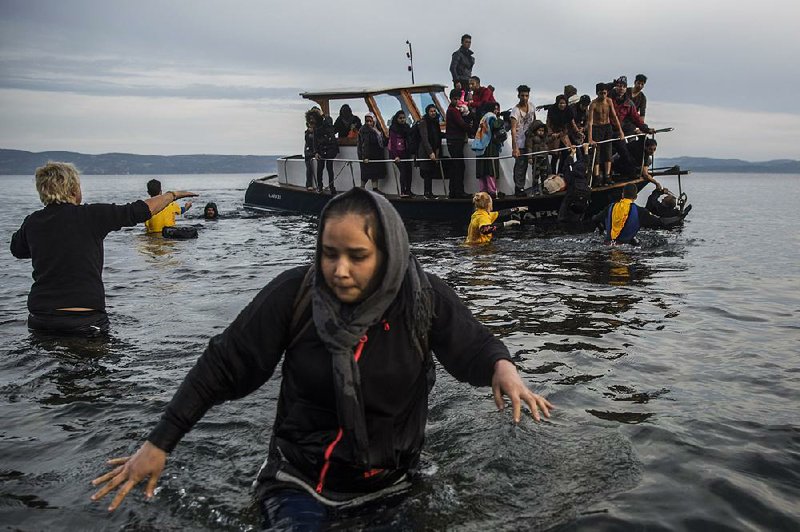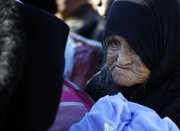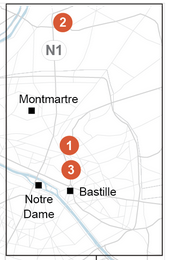PARIS -- French prosecutors confirmed Monday that the fingerprints of one of the suicide bombers in the Paris attacks matched a set taken in Greece last month in the clearest sign yet that one of the attackers blended in among the hundreds of thousands of migrants who have arrived in Europe this year.
The news will almost certainly add fuel to an already heated debate in Europe over how to handle the massive influx of migrants pouring into the continent.
Among the multiple assailants who launched coordinated attacks Friday, leaving 129 dead, was a suicide bomber who blew himself up outside a soccer stadium in Paris. A Syrian passport was found near his body with the name Ahmad Al Mohammad. Authorities stressed that the passport has not been authenticated.
But the fingerprints link the migrant trail to the terrorists attacks, and could affect attempts by the European Union to come up with a coordinated policy for the migration crisis. It could also provide fodder to those calling for tighter border controls in connection with concerns that militant groups such as the Islamic State will use the migrant trail as a way to slip members into Europe.
On Monday, Marine Le Pen, leader of France's far-right National Front party, called for an "immediate halt" to France's intake of migrants, adding that "our fears and warnings about the possible presence of jihadists among migrants" entering the country had proven to be true.
An attacker was "among the mass of migrants who flock" to Europe each day, she said in a statement.
"For those of us who work on refugee issues, this is something we have been afraid of for awhile: What would happen to public perception if there was a terrorist attack in Europe?" said Alexander Betts, an expert on migration issues at the University of Oxford.
He noted that the "big silent majority" in Europe "want to be compassionate to refugees and asylum-seekers, but their support for asylum and immigration is fragile," he said.
Robin Niblett, director of Chatham House, a London-based think tank, said the revelations could have significant consequences for the Schengen Agreement, a treaty that eliminated internal border checkpoints within Europe.
"Having a nice, open Schengen Agreement was fine when you didn't have a ring of fire around Europe," he said.
Even before the confirmation of matching fingerprints, the rumor mill was swirling with suggestions that a bomber had made his way to France via Greece.
European Commission President Jean-Claude Juncker on Sunday urged world leaders not to mistake genuine asylum seekers for terrorists. He said that those behind the bloody nightmare that unfolded Friday were "exactly those who the refugees are fleeing," adding that "there is no need to revise the European Union's entire refugee policy."
It was not clear whether the passport was real or fake, but trafficking in fake Syrian passports has increased as hundreds of thousands of people try to get refugee status, the chief of the European Union border agency Frontex has said.
Most of those who enter countries on the so-called Balkan corridor for migrants -- Greece, Macedonia, Serbia and Croatia -- are registered with authorities. Their data are checked against Interpol records, and their fingerprints and photos are taken. But, many people tell officials that they've lost their identity papers, and they can give false names and other information, including their country of origin.
A large majority of migrants declare themselves as Syrians from the war-torn country, although they have no documents to prove it, Serbian police say. Syrian refugees have a better chance of getting asylum in Germany than those classified as economic migrants from Afghanistan, Iraq or Pakistan.
In Serbia, some 490,000 migrants have passed through this year, and many say they don't have documents -- making it impossible to check for terrorist connections or criminal histories, to verify their backgrounds, Serbian officials said Sunday. There are no recorded cases of people being turned away after random checks anywhere in the Balkan migrant corridor.
That may be because the corridor states want migrants to pass through quickly, without getting stuck in their territory for a long time before reaching rich EU states such as Germany, Sweden or France.
"No one can know for certain where they come from, their true identity or if their documents are genuine," Serbian labor minister Aleksandar Vulin said. "The Paris suspects have not been registered anywhere as terrorists, so Serbia could not have known that they represent a danger."
Frontex spokeswoman Ewa Moncure told The Associated Press that "among some 500,000 people, you will find some with false documents."
Information for this article was contributed by Karla Adam and Stephanie Kirchner of the Washington Post and Dusan Stojanovic, Jovana Gec and Monika Scislowska of the Associated Press.
A Section on 11/17/2015



